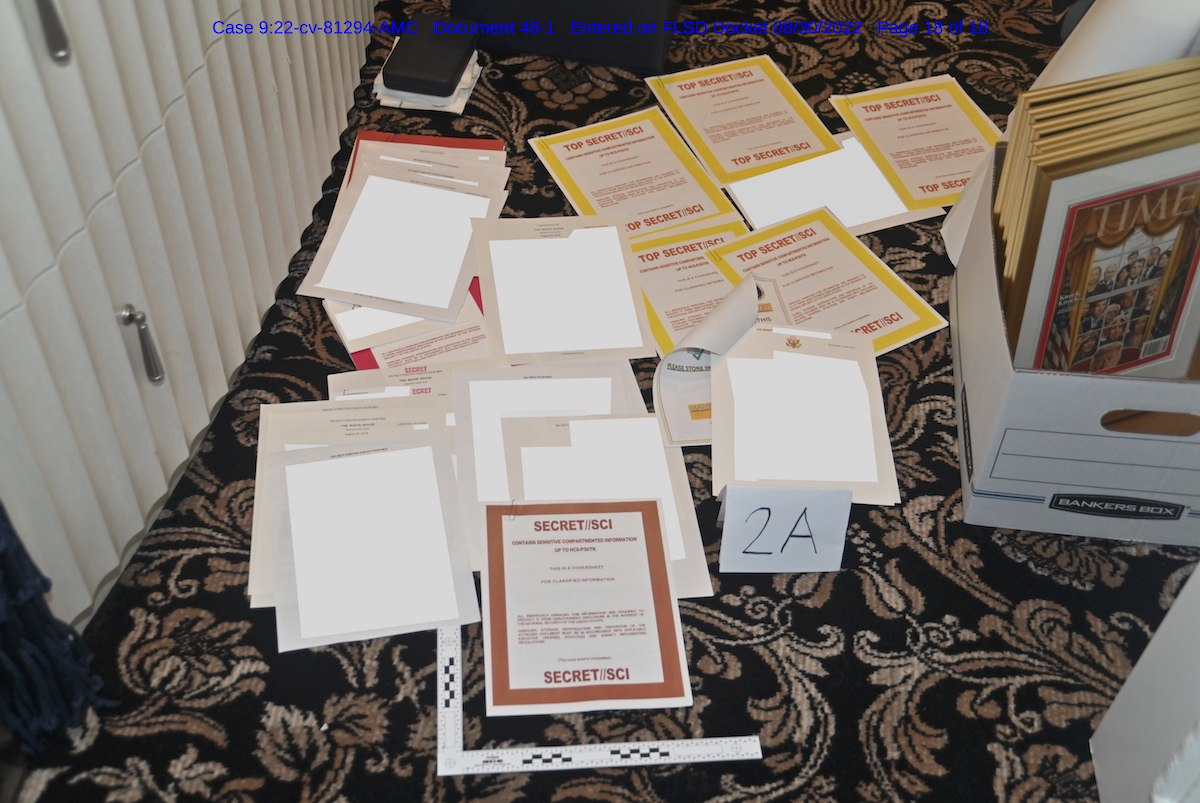
Former President Donald Trump
In a bombastic letter filed late Wednesday, attorneys for ex-President Donald Trump balked that a deadline agreed upon by the U.S. Department of Justice was proving to be unworkable in a dispute over documents seized by the FBI from Trump’s Mar-a-Lago home and resort. Trump’s attorneys argued that they had the right plan all along for moving forward in the matter. Plus, in a concomitant filing, Trump’s lawyers also refused to sign off on a “revised” inventory report of materials the DOJ said were taken from Mar-a-Lago on Sept. 8.
The latest letter to Special Master Raymond Dearie is postured as a response to a government request for more time to secure a software vendor to handle what Trump’s lawyers say are 200,000 documents seized from the former president’s palatial compound. The government has asserted that some of the documents were classified or top secret and that a criminal investigation is afoot; the precise targets of that investigation are not named.
Trump’s attorneys said they were fully aware — and had indeed warned — that the process would not move as swiftly as the government asserted:
While Plaintiff does not object to the Government’s request for additional time, its recent submission represents an inefficient multi-step process that will ultimately lead to the adoption of a more realistic schedule, like the one suggested by Plaintiff from the inception. At the status conference before the Special Master, the Plaintiff suggested that the dates put forth in the Draft Case Management Plan were unlikely to prove feasible in terms of both the likely start of the document flow and the man-hours necessary to review more than 11,000 pages or documents. Indeed, the Plaintiff suggested that a rough rule of thumb in document reviews is 50 pages per hour. Building into his calculations the review and categorization of the filter team documents; the successful recruitment, retention, and start-up operation of a data vendor; and the requisite review and categorization of that many documents led the Plaintiff to suggest mid-October as a completion date. Government counsel assured Your Honor that a minimal adjustment of “a couple of days” was all that was needed, but that otherwise the Plan was perfectly acceptable.
Now, for the second time since its blithe dismissal of practical experience, the Government comes to the Court to readjust deadlines. And again, the Government’s request dismisses the Plaintiff’s more realistic deadlines as unnecessary. To be clear, we think the prosecutor working with Plaintiff’s counsel to navigate the process of soliciting and contracting with a data vendor, and beginning the operational business of data management, is acting expeditiously and in good faith. However, the overall position of the Government continues to be overly optimistic and aggressive in terms of the timing of productions and Plaintiff’s review, which is why Plaintiff respectfully renews his position that mid-October is a realistic final production deadline.
Trump’s lawyers balked that the government’s reference to 11,000 “documents” really meant “closer to 200,000 pages” (emphasis in original). The sheer volume of material has given some software vendors pause, according to Trump’s lawyers:
That estimated volume, with a need to operate under the accelerated timeframes supported by the Government, is the reason why so many of the Government’s selected vendors have declined the potential engagement. In short, seasoned IT professionals who routinely work on large-scale document productions with the Government cannot meet the Government’s proposed schedule, and it was never realistic for the Government to suggest such a narrow timeframe. Consequently, the Plaintiff respectfully suggests that Your Honor and the parties will be best served by having the retained vendor convey a supportable timeframe for scanning roughly 200,000 pages into a platform, and also provide a breakdown of roll- out quantities and proposed deadlines. It would be better to base deadlines on actual data and not wistful claims by the Government.
The Government also uses the opportunity of asking for an extension of deadlines to lecture Plaintiff’s counsel with conclusory and antagonistic comments regarding counsel’s privately filed objections to the Amended Case Management Plan. DOJ continues to mistake itself as having judicial authority. Its comments are not argument, but proclamations designed to steamroll judicial oversight and the Plaintiff’s constitutional rights. Along those lines, by participating in this litigation, the Plaintiff has not waived, and cannot be deemed to have waived, his rights under the Federal Rules of Civil Procedure and the Federal Rules of Criminal Procedure, or any of his rights and immunities arising under the Constitution of the United States.
Additional qualms involved several instances where the government’s “investigative team” was “exposed to material” that was destined for a government “filter team” or “taint team.”
Trump’s attorneys called that situation a “filter failure.”

Federal prosecutors say FBI agents seized these materials from Mar-a-Lago. The contents of the documents were redacted with white squares. (Image via an Aug. 31, 2022 federal court filing.)
Another so-called “filter failure” involved the delivery of an email to what the DOJ called the “FBI case team” — presumably the investigative team. Trump’s attorneys claimed the email “falls squarely into the category of attorney-client privileged” material and should not have been viewed by the investigative team.
Then, Trump’s attorneys complained about discrepancies between a detailed inventory report and a so-called “revised” version of that report:
The Government also provided the Special Master and the Plaintiff with its third version of the inventory in this case, with 53 new documents, clippings, or photos appearing across 16 of the 33 item numbers. A prior entry for “2 empty folders with ‘CLASSIFIED’ Banners” has disappeared from Item #33.
“The unilaterally imposed filter team, which made no effort to contact Plaintiff’s counsel throughout its review process, has admitted to three breaches so far,” Trump’s attorneys wrote. “All this before review by the Special Master and the Plaintiff. By way of this filing, Plaintiff is asking the Special Master to order disclosure of the names of each attorney and Special Agent who was exposed to materials eventually provided to the Privilege Review Team.”
Trump’s counsel has long asserted that a fully independent special master — not just a taint team within the DOJ and FBI — is necessary to review the material. U.S. District Judge Aileen Cannon, a Trump appointee who is overseeing the case, agreed with that premise, but prosecutors convinced the 11th Circuit Court of Appeals to overrule some of Cannon’s orders on the matter. The 11th Circuit allowed the DOJ to continue with a criminal review of the seized materials; Cannon, at the behest of Trump’s lawyers, would have paused the review entirely until the special master ascertained the extent of privileged material — if any — that was swept up in the Aug. 8 search at Mar-a-Lago.
Trump attorneys James M. Trusty of Washington, D.C.; Lindsey Halligan of Fort Lauderdale, Florida; and M. Evan Corcoran of Baltimore, Maryland, are on the document. Absent is the name of Chris Kise, a Trump lawyer who CNN reported had been “sidelined” from the case.
Attached to the Wed., Sept. 28 letter which objects to the government’s timeline of the case review process is an earlier Sat., Sept. 25 letter to Judge Dearie that does bear Kise’s name. The earlier letter complains that Dearie overstepped his bounds by asking “a Government official” (emphasis in the original) to submit the aforementioned revised detailed inventory report.
Dearie had asked Trump’s lawyers to sign off on the proffered inventory — the one vouched for by the government via affidavit. In essence, Dearie appeared to be attempting to force Trump’s attorneys to admit whether any of materials offered by the DOJ were not seized at Mar-a-Lago. Trump had asserted on Sean Hannity’s Fox News broadcast on Wed., Sept. 21 that the FBI may have planted evidence at Mar-a-Lago; however, Trump’s attorneys had not made such claims in court.
Trump’s lawyers appeared reluctant to take Dearie’s bait and declined to sign off on the government’s revised inventory. The second letter explains their rationale by highlighting a difficult juxtaposition: Trump’s attorneys said they have “no means of accessing the documents bearing classification markings” and therefore could not vouch for the latest inventory report on file.
From the Sept. 25 letter:
The Appointing Order contemplated no corresponding declaration or affidavit by Plaintiff, and because the Special Master’s case management plan exceeds the grant of authority from the District Court on this issue, Plaintiff must object. Additionally, the Plaintiff currently has no means of accessing the documents bearing classification markings, which would be necessary to complete any such certification by September 30, the currently proposed date of completion.
Trump’s attorneys say Dearie’s case management plan “goes beyond” the grant of authority contemplated by Cannon’s order appointing Dearie; therefore, Trump’s attorneys objected to Dearie’s plan.
Both letters are embedded below:
[Image via Jeff Swensen/Getty Images]